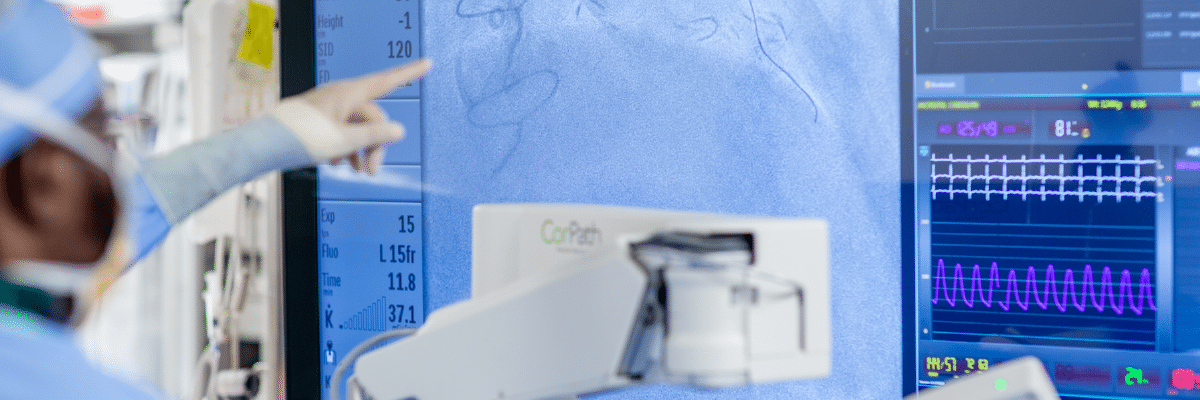Interventional Cardiology

Miniminally Invasive Cardiovascular Care
Interventional cardiologists diagnose and treat coronary artery disease, vascular disease, structural heart disease, and congenital heart defects – all without surgery. In many heart attack cases, they form the front line of emergency care to save patients and minimize permanent damage.
Using small, flexible tubes called catheters, they access damaged or diseased tissue, blockages, and other problems, then they correct defects and clear blockages within blood vessels. We recommend interventional procedures whenever possible because they tend to be faster to complete, much safer and less painful for patients, and result in much speedier recoveries.
Our Services
Whether you suffer chest pain or an irregular heartbeat, blockages, or valve issues, Grady’s interventional cardiologists provide the services through specialty labs, clinics, and programs:
The cath lab routinely addresses chest pain caused by narrowed or blocked arteries. Our interventional cardiologists first perform a diagnostic test like angiography (a medical imaging technique to see inside blood vessels and organs) or an intravascular ultrasound (which inserts a special ultrasound device into the blood vessels). Or, if possible, they may do a transradial heart catheterization, which achieves many of the same goals but with even lower risk because the catheter is inserted through the radial artery in the arm and threaded to the heart, then small tools are used to diagnose the problem.
Once a diagnosis is completed, our interventional cardiologists can often correct the problem using the same catheter – for example, eliminating blockages with an atherectomy (a minimally invasive procedure to remove plaque from the blood vessel), a balloon angioplasty (which widens a narrowed blood vessel using a small balloon delivered via catheter); or by inserting a stent (a catheter-delivered device to keep a narrowed or blocked blood vessel open). In the case of heart valve problems, our interventional cardiologists can perform a valvuloplasty (a minimally invasive procedure to repair a heart valve with a narrowed opening).
The cath lab also uses catheters to perform cardiac ablations, procedures that scar tissue in the heart to block abnormal electrical signals. Ablation is used to restore a normal heart rhythm.
When irregular heartbeats or arrhythmias cannot be treated with medicines or ablation therapies, Grady’s device team can insert an implantable cardioverter-defibrillator (ICD) or pacemaker to help restore a regular heartbeat or the WATCHMAN, a quarter-size device that closes the left atrial appendage (LAA), a blind pouch of heart tissue, to prevent blood clots.
Grady’s Electrophysiology Lab is the place where interventional cardiologists diagnose and treat a number of conditions, including:
- Abnormal Heart Rhythms, also known as arrhythmia, occur when your heart beats too fast (a condition known as tachycardia), too slow (bradycardia), irregularly (atrial fibrillation), or in a racing manner (atrial flutter). Arrhythmia can be serious, but most cases can be controlled with lifestyle and dietary changes, medication, minimally invasive procedures that would be performed in the Electrophysiology Lab, or surgery.
- Sudden Cardiac Arrest, which occurs suddenly and often without warning. It usually results from an electrical malfunction in the heart that disrupts the heart’s pumping action, cutting blood flow to the brain, lungs, and other organs. Treatment may include medications, implanting a device to regulate the heartbeat, or other procedures.
- Syncope, the medical term for fainting is caused by a temporary drop in the amount of blood that flows to the brain and can occur if you experience a sudden drop in blood pressure, a slowed heart rate, or changes in the amount of blood in areas of your body. Treatment usually involves medication and dietary and lifestyle changes. In some cases, the condition may require the implantation of a pacemaker or implantable cardiac defibrillator to control the heart rhythm.
- Valvular Disease, which occurs when any heart valve is damaged or diseased. This forces the heart to work harder, either because the blood is leaking back into the chamber or against a narrowed opening. The condition can lead to heart failure, sudden cardiac arrest, and death. It may be managed with medicines, but if the valve is seriously diseased, surgery may be needed to replace the valve.
- Heart Failure, which occurs when the heart doesn’t pump blood as well as it should. It results in blood backing up and fluid building in the lungs, causing shortness of breath, fatigue, swollen legs, and a rapid heartbeat. Treatments include lifestyle changes, eating less salt, limiting fluid intake, and taking prescription medications. In some cases, a defibrillator or pacemaker may be implanted. Learn more about our heart failure care.
Grady’s Pulmonary Embolism Response Team (PERT) is on the front line of heart care. Pulmonary embolisms are extremely common, with more than 200,000 cases a year across the nation. A pulmonary embolism occurs when a blood clot lodges in an artery, blocking blood flow. In some cases, the embolism can be treated using medicines. In more serious cases, the PERT Program interventional cardiologists use a specialized catheter-based treatment to remove the clot and restore healthy blood flow.
Locations and Directions
Grady Memorial Hospital
80 Jesse Hill Jr Drive SE
Atlanta, GA 30303
Heart & Vascular Center - 2nd Floor
Emergency Care: 24 hours a day, 365 days a year
Outpatient Care: Monday-Friday: 8 AM - 5 PM
(404) 616-1000 (Main)
(404) 616-1000 (Appointments)
Parking is available
Public Transportation
- Georgia State Station (0.5 Miles)
Why Choose Us
Not all heart attacks are alike. Grady is equipped to handle the most challenging: ST-segment elevation myocardial infarction (STEMI). This is the deadliest kind of heart attack, occurring when a coronary artery is completely blocked, and a large part of the heart muscle cannot receive blood.
STEMIs require immediate, emergency procedures to restore blood flow through the artery to reduce damage and prevent death. Blood flow can be sometimes be restored with medications like clot busters. But it often requires angioplasty – which requires an interventional cardiologist to use catheters to open the closed artery and immediately reestablish healthy blood flow.
Not every hospital is STEMI-ready. As Atlanta’s busiest Level I Trauma Center, Grady’s STEMI experience is unparalleled. Our people handle countless cardiac emergencies every year. And that experience serves both our emergency patients and those scheduled for necessary but less acute inpatient intervention.
Appointments and Referrals
Grady’s Heart & Vascular Center accepts new patients with referrals from either primary care providers or other specialists. Please ask your provider to use our patient referral checklist and email us the details. We will contact you to schedule an appointment.
If you are an existing Grady patient and have a MyChart account, visit MyChart or call our scheduling line at (404) 616-1000, to make an appointment.
Our Doctors
Every hospital treats patients. At Grady, we strive to treat them better, more efficiently, and more effectively. Our mission to care for all who need us attracts cardiovascular specialists from across the nation. They are drawn here by the knowledge that we test the limits of medicine by innovating existing standards of care, researching cutting-edge drugs and therapies, and exploring novel treatments.
Our zeal for innovation has given Grady a national reputation for medical advancement in areas like cardiovascular disease, cancer, burn, stroke, diabetes, infectious diseases, women’s health, sickle cell, and other conditions cared for by specialists in our centers of excellence. Access to all of these accredited practices is available to every Grady patient and our collegial environment means that specialists routinely help to care for their colleagues’ patients.


